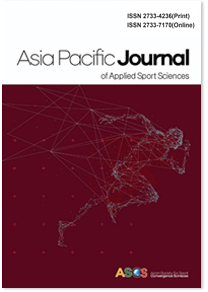
Asia Pacific Journal of Applied Sport Sciences
• Korea Citation Index (KCI)
• Number of Publications: The journal is published three times a year, in the end of April, August, and December.
• Submission Deadlines Submissions must be made by the end of April, August, and December.
• ISSN : 2733-7170 (online)
• Year of Launching : 2020. 04. 30
• Editor-In-Chief : Prof. Brian H. Yim(Kent State University, USA)
![]()
Bridging the Distance: Non-local Alumni Sport Fans’ Media Use MotivationMin Jung Kim , Hyunseok Song , Wooyoung william Jang , Wonjun Choi , Kevin K. Byon 6(3) 1-19, 2025 DOI:10.46695/ASCS.6.3.1
|
Research Trends in Chinese Martial Arts through Keyword Network Analysis: Evidence from the Web of ScienceYiwen Huang , Haiqing Yang , Wanghui Li , Wang Yuan 6(3) 19-55, 2025 DOI:10.46695/ASCS.6.3.2
|
Sustainability in Sport Tourism: Current Trends and Future DirectionsZixiang Zhou 6(3) 55-71, 2025 DOI:10.46695/ASCS.6.3.3
|
From Persuasion Intentions to Sustainable Loyalty: The Chain Mediating Role of Identification and Commitment in Sports SponsorshipZhibo Tian , Yuzhu Xu , Qiang Zhang 6(3) 71-95, 2025 DOI:10.46695/ASCS.6.3.4
|
Sport Policy in North Korea: Regime-Specific Trajectories and ChallengesSeungil Park , Taehee Kang , Seokjun Cho 6(3) 95-112, 2025 DOI:10.46695/ASCS.6.3.5
|






